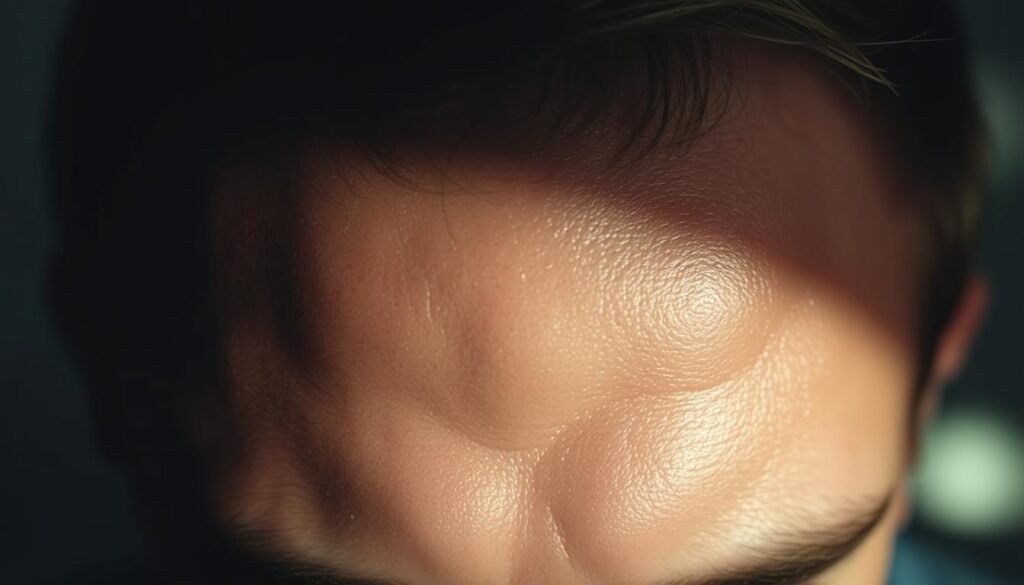About 32 percent of those with social anxiety also suffer from too much sweating. The International Hyperhidrosis Society shared this fact. It shows how deeply anxiety can affect us, making us sweat more. This increase in sweat can sometimes make the anxiety worse, as people worry about the sweating itself.
So, does anxiety lead to sweating? The answer is usually yes. Knowing how stress affects our bodies is key. It helps us find ways to handle both the stress and its symptoms better. Realizing how they’re connected can change how we deal with them.
Key Takeaways
- Up to 32% of people with social anxiety may experience hyperhidrosis.
- Anxiety sweating can create a feedback loop that exacerbates stress levels.
- Understanding the physiological responses of the body can aid in managing anxiety sweating.
- Various treatment options like therapy and medications are available for managing anxiety-induced sweat.
- Deep breathing and relaxation techniques can help reduce stress and sweating.
Introduction to Anxiety and Sweating
Anxiety and sweating often happen together, especially when you’re really stressed. Sweating is natural and helps control our body temperature. But with anxiety, you sweat more than usual. This can happen on your forehead, hands, or underarms when you feel under pressure.
Having anxiety all the time can disrupt your daily life. Many people with anxiety sweat a lot. Treatments for anxiety might also make you sweat more. This makes it harder for some folks.
It’s important to understand the link between anxiety and sweating. Keeping cool, trying to relax, and asking for help can make things better. There are places to learn more about how anxiety and sweating are connected. You can find more information and help at detailed discussions.
Anxiety affects the body in more ways than just sweating. Itching can also get worse and make you feel more stressed. It shows how our emotions and physical reactions are linked. For more on this connection, check out resources from health organizations.
What is Anxiety Sweating?
Anxiety sweating is when our emotions make us sweat more than usual. It happens in different levels and can cause different reactions. We will learn about why our bodies react this way when we’re stressed. We’ll also look at the kinds of anxiety sweating and how our bodies make it happen.
Types of Anxiety-Related Sweating
There are mainly two kinds of anxiety sweating:
- General sweating due to anxiety: This happens during stressful moments. It’s the normal amount of sweating we feel when we’re nervous.
- Hyperhidrosis: This is when you sweat a lot more than normal because of anxiety. It’s hard to control and can mess with daily life and meeting people.
Sweating is natural, but hyperhidrosis might need a doctor’s help. This is important because it impacts how we feel about ourselves and our life.
The Physiology Behind Anxiety Sweat
The reason we sweat more when anxious is because of our sympathetic nervous system. When we’re stressed, it releases hormones like cortisol and adrenaline. These hormones make us sweat. Here’s a short explanation of how it works:
| Process | Description |
|---|---|
| Stimulus | Stressful situation or anxiety-inducing event. |
| Sympathetic Activation | Nerves activate, preparing the body for “fight or flight.” |
| Hormonal Release | Cortisol and adrenaline increase, leading to sweating. |
| Result | Increased body temperature and moisture on the skin. |
This shows that anxiety sweating starts with stress and the body’s response. It highlights how our minds and bodies are closely connected.
Does Anxiety Cause Sweating?
Can anxiety make you sweat? To answer this, let’s look at how the body deals with stress. The sympathetic nervous system is key here. It’s behind the fight-or-flight response. When we face stress, from work or social situations, our body gears up for action. This can make us sweat.
The Role of the Sympathetic Nervous System
When this system kicks in, it releases adrenaline. This hormone is a big reason we sweat when anxious. We then see our heart rate go up and start to perspire more. This makes people wonder if their sweating is due to anxiety. Indeed, stress and sweating feed off each other, worsening the situation.
Emotional Reactions and Sweating
Anxiety doesn’t just affect us physically. It also makes us feel more distressed. For many, this leads to sweating that messes with daily life. In social situations, the extra sweating can be embarrassing. This increases anxiety even more. While mindful breathing can help ease the sweating, ongoing anxiety might require expert guidance.
| Factor | Impact on Sweating |
|---|---|
| Stressful Situations | Increases perspiration during encounters |
| Physical Activity | Can exacerbate symptoms in anxious individuals |
| Emotional Reactions | Triggers heightened sweating responses |
| Sleep Disorders | Associated with night sweats due to anxiety |
| Hormonal Changes | Can increase frequency of anxiety-related sweating |
Common Areas Affected by Anxiety Sweating
Anxiety sweating often occurs in various body parts unexpectedly. Knowing which areas are mostly affected can help manage the discomfort and shame. The palms, soles, face, and armpits are commonly impacted. These areas show how anxiety can cause sweating.
Palms and Soles
The palms and soles often sweat a lot when anxious, especially in stressful moments. This makes it hard for people to do normal activities that involve touching or moving. A rush of nervousness activates the eccrine glands here, causing uncontrollable sweating. This can make anxiety even worse.
Face and Armpits
The face and armpits also sweat due to anxiety. This can make people feel very self-aware. In tense times, the apocrine glands in the armpits produce a kind of sweat that smells and might lead to body odor. Sweating in the face and armpits can make emotional stress worse, creating a cycle of more anxiety and sweat.
| Area Affected | Type of Sweat | Impact on Anxiety |
|---|---|---|
| Palms | Eccrine Sweat | Inhibits daily tasks, amplifies nervousness |
| Soles | Eccrine Sweat | Affects mobility, increases anxiety |
| Face | Apocrine Sweat | Triggers embarrassment, heightens stress |
| Armpits | Apocrine Sweat | Enhances body odor, increases insecurity |
By understanding how anxiety sweat shows up in certain body parts, people can face their feelings. This helps find ways to deal with anxiety sweating better.
The Connection Between Social Anxiety and Hyperhidrosis
Social anxiety and hyperhidrosis are closely linked, making social situations tough for many. People with social anxiety often feel embarrassed by their sweat. This can make their anxiety worse. It’s a tough cycle that affects everyday life.
Understanding Social Anxiety Disorder
Social anxiety means being very afraid of being judged in social settings. It leads to avoiding touch, pulling away from people, and always feeling watched. This fear can cause a lot of sweating, making socializing even harder.
Statistics on Hyperhidrosis and Anxiety
Studies show a strong link between hyperhidrosis and social anxiety. About 32% of people with social anxiety sweat excessively. While anxiety doesn’t cause hyperhidrosis, sweating can make anxiety worse. Treating both may help a lot.
| Aspect | Social Anxiety Disorder | Hyperhidrosis |
|---|---|---|
| Prevalence | Affects about 7% of the population | Approximately 5% of the population |
| Connection | Can exacerbate sweating | May trigger social anxiety |
| Common Symptoms | Fear of judgment, avoidance of social situations | Excessive sweating in specific areas |
| Treatment Options | Therapy, medication | Botox, endoscopic sympathicolysis |
People with hyperhidrosis deal with a lot of stress from managing sweat. Avoiding places and feeling shame are common. Tackling both social anxiety and sweating is key to a better life.
Other Anxiety Disorders Associated with Sweating
Sweating can be a sign of different anxiety disorders. Knowing why these disorders cause sweating helps people handle their symptoms better. Disorders such as panic disorder trigger severe sweating during panic attacks. Specific phobias also cause sweating when facing a feared situation or object.
Panic Disorder
Panic disorder leads to sudden panic attacks and heavy sweating. Those who have it may feel their heart racing, feel dizzy, and have trouble breathing. These symptoms happen because the body gets ready to either fight or flee. This disorder can make people scared of another attack. They might avoid places or situations to prevent one, affecting their daily life.
Specific Phobia and its Effects
When facing something scary, like high places, animals, or speaking in public, people with specific phobias sweat a lot. This sweating adds to their stress in those situations. Their body is just reacting strongly to stress. It is important to understand these reactions to treat them well. Therapies and medications can help reduce this anxiety-induced sweating. For more help with anxiety and its physical effects, go to this page.

The Unique Characteristics of Anxiety Sweat
Anxiety sweat is not the same as what you get from exercising. It smells and feels different because of what’s in it. This is because of how our body handles and makes this type of sweat.
Differences Compared to Exercise Sweat
Exercise sweat is mostly water and salt. It helps cool down the body. But anxiety sweat comes from a different type of gland and has fats and proteins. This makes it smell stronger and feel different.
The Impacts of Stress Sweat on Body Odor
Stress makes you sweat more in places like your underarms and hands. This kind of sweat can make body odor worse because it gives bacteria a place to grow. The longer these bacteria stay on the skin, the stronger the odor becomes. It’s different from how sweat from exercising smells.
| Type of Sweat | Composition | Odor |
|---|---|---|
| Exercise Sweat | Water and salt | Mild, typically not offensive |
| Anxiety Sweat | Fatty acids and proteins | Stronger, often more pungent |
Tips to Manage and Reduce Anxiety Sweating
Anxiety sweating is a common problem. Many people deal with it. There are helpful strategies to manage it. Techniques for relaxation and changes in lifestyle can lessen the symptoms. It’s important to know when you should seek help from a professional if the sweating is really bad.
Relaxation Techniques
Learning to relax is key in controlling anxiety sweating. Deep breathing, imagining peaceful scenes, and relaxing muscles step by step help soothe the nervous system. These steps make the body calm and reduce sweating. Practicing these can help manage how your body reacts to stress. Check out stress management strategies for more tips.
Lifestyle Adjustments for Managing Sweat
Making simple changes in your life can improve anxiety sweating. Use powerful antiperspirants like LYNX for protection against sweat for 48 hours. Choose clothes that are loose and made of breathable material. This makes you feel more comfortable. Drink cool water to keep your body temperature in check and reduce sweating. Also, exercising regularly helps you relax and controls anxiety. Avoid hot food and too much caffeine to prevent sweating triggers.
When to Seek Professional Help
If anxiety sweating affects your daily life, it’s time to get professional help. In serious cases, therapy and medicines can offer relief. Group therapy, like what Grouport Therapy provides, helps many. 70% of those joining saw great improvement in eight weeks. Knowing what you need helps find the right treatment.

| Adjustment | Benefit |
|---|---|
| Deep Breathing Exercises | Calms the nervous system |
| Strong Antiperspirants | Reduces sweating for up to 48 hours |
| Loose-Fitting Clothing | Enhances comfort and airflow |
| Regular Exercise | Promotes relaxation and overall well-being |
| Hydration | Helps regulate body temperature |
| Avoiding Spicy Foods | Reduces potential sweating triggers |
Medical Treatments for Excessive Sweating
Excessive sweating, or hyperhidrosis, affects daily life. It’s often triggered by anxiety. Luckily, many treatments exist for it. These range from simple creams to advanced medical procedures. People can find relief with treatments that match their needs.
Antiperspirants and Other Topical Treatments
Antiperspirants are a first step for managing sweat due to anxiety. Over-the-counter options are available, but prescriptions work better for serious cases. They contain aluminum chloride. There are also creams like glycopyrrolate. They stop sweat right where it happens.
Botox and Other Advanced Procedures
Botox is a popular choice for serious relief. It works by stopping the nerves that trigger sweating. The effects last for months, helping greatly with hyperhidrosis. Other choices include iontophoresis, microwave therapy, or surgery, depending on the situation.
| Treatment Type | Description | Duration of Effect |
|---|---|---|
| Over-the-Counter Antiperspirants | Commonly available products for mild sweating | Varies by usage |
| Prescription Antiperspirants | Products with higher aluminum chloride concentration | Can last up to several days |
| Glycopyrrolate Creams | Topical application to minimize sweating | Effectiveness varies |
| Botox Treatment | Injections that block nerve signals to sweat glands | 4-12 months |
| Iontophoresis | Device-based treatment for hands and feet | Requires regular sessions |
| Surgical Options | Procedures to remove sweat glands or block nerves | Long-term relief; varies |
Choosing the right treatment can make life better. Knowing about these options helps people get the care they need. This can lead to a much-improved day-to-day experience.
Understanding the Psychological Impact
Anxiety sweating can deeply affect people. It can cause embarrassment, shame, and a lot of discomfort. People who sweat a lot often struggle in social settings. This can make their anxiety and mental health issues worse. It’s interesting to note that about 75% of these individuals say their social life and happiness are negatively impacted.
About 4.8% of people in the US, which is around 15.8 million, suffer from hyperhidrosis. This condition doesn’t just affect their bodies but their minds too. Nearly half of them feel their life quality is poor. The emotional burden is heavy, leading to more cases of anxiety and depression among them. Anxiety rates in such people are about 21.3%, while depression rates are 27.2%. This is much higher compared to those who don’t have this problem.
People with anxiety sweating often avoid social situations and feel really bad about themselves. We can’t ignore the mental effect this issue has. It’s very important in understanding overall mental health for those affected. Getting help through therapy or counseling can make a big difference. It can help manage both the anxiety and its symptoms. This could really help improve their life quality.

| Aspect | Patients with Hyperhidrosis | General Population |
|---|---|---|
| Rate of Anxiety | 21.3% | 7.5% |
| Rate of Depression | 27.2% | 9.7% |
| Patients Reporting Poor QoL | 48% | N/A |
| Negative Impact on Social Life | 75% | N/A |
Conclusion
Understanding how anxiety and sweating are related is key. It impacts millions in the U.S. With 40 million Americans dealing with anxiety disorders, we often wonder if anxiety leads to sweating. For those facing anxiety, sweating can be a big challenge. It can cause embarrassment and social issues, especially with social anxiety or phobias.
It’s important to know, though, that there are ways to handle excessive sweating. People can try changing their lifestyle, seeking therapy, or getting medical help. But only 36.9% of those affected actually seek assistance. Raising awareness on how to manage this issue can help people take action for better health.
Self-care and support networks can greatly enhance one’s life. Treatments like psychotherapy or medicines, including antidepressants and beta-blockers, can make a big difference. They don’t just reduce sweating but also improve mental health. Ultimately, dealing with anxiety and sweating is about regaining confidence and comfort in daily life.